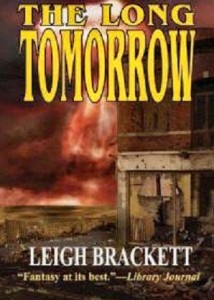I recently read (reread) Leigh Brackett’s 1955 novel, The Long Tomorrow. In a nutshell, this is a thoroughly underappreciated classic that ought to have the same attention and regard as other social commentary novels of around that period. Given the political landscape today, it is remarkably trenchant.
The novel follows Len Coulter, who we meet at a large county fair near his home somewhere in Pennsylvania, in a country completely altered after a world war that left the cities in ruins and the only ones equipped to survive in the reduced technological circumstances that resulted were groups of religious communities like the Amish and Mennonites and similar enclaves who had eschewed modernism to begin with. Len is a member of a New Mennonite community.
As the novel opens, his cousin Esau is trying to dare him into attending a revival meeting outside the boundaries of the fair, something they have both been forbidden to do.
The tensions between the various groups of believers are kept in check by the constraint of circumstance. They need each other and cannot afford the luxury of complete separation. But there are walls and this is one of them. As such it also represents a kind of rite of passage for the adolescents.
This is a time and place where laws have been passed to keep the possibility of another war massively in check by keeping the technology that produced the atomic bombs suppressed. Brackett made the savvy observation that it was the expansion of urban centers that permitted the kind of wealth, leisure, and political pressure to drive an ever-increasing and complicating technological base, so the Constitution has been amended to make towns of more than a thousand people and two hundred buildings illegal. This enforced small town agrarianism has, in fact, achieved a kind of equilibrium. People are not unaware of the past. Libraries still exist, people read, but the cultural paranoia created by the devastation dominates.
Behind all this is the legend of Bartorstown, a place—somewhere—where the old technologies not only exist but people work with them to create new. It’s a kind of boogieman story, but Len and Esau learn that it is not a lie, that there is such a place. After seeing a member of Bartorstown denounced and stoned to death at the revival he and Esau attend, it becomes an obsession for Len.
And then Esau steals a radio and the two boys commit themselves to finding Bartorstown, no matter what.
There are no bad people in this novel. In fact, there are no good people, either, not in terms of Good vs Evil. Len is human to a fault and Esau often has feet of clay. They run away from home and grow up in the river towns of the Ohio and encounter all manner of people, some good, some not so good, but all of them doing what they think is right. Brackett painted very subtle and sophisticated portraits of human beings struggling to bring about change and simultaneously resist change. At times, it gets ugly.
If there is an evil at the heart of this novel, it is in Brackett’s chilling portrayals of mob violence. She understood how individuals could lose their capacity to think and act as moral agents when caught up by fear and passion in a wave of group reaction. Fear, of course, and then anger unhinges people and perhaps the next day or the next month they come to regret what they did, but they seem incapable of doing otherwise at the time.
Laced throughout this is the thesis that any time we try to establish a set of inviolable rules to make people conform, we find over time that such rules simply do not maintain, not the way they were intended. Too rigid a stance almost guarantees that such rules, such prohibitions will not only be violated but will themselves become the source of considerable harm.
Len’s journey from adolescent obsession to mature accommodation to things he ultimately cannot understand is poignant and frustrating. This is not a standard-issue science fiction novel in which knowledge and truth set people free and all doubts are swept aside in the Eureka glow of enlightenment. Len finds Bartorstown and it is nothing like he expected. In fact, at its heart is the very thing he had been raised to fear more than anything else, and yet he is told that it must not only exist but that humans must learn to control it.
If I have a problem with this novel, it is in the all-too-typical treatment of women. Too many of them are ultimately just vain and dependent and stereotypical. But Brackett was juggling a lot in this book, so I gave her a pass on this in light of all the rest that she was so clear and prescient about.
Given the current global scene in which mobs seem to coalesce out of the very air over some of the most inane issues and great violence is done—more often than not driven by religious leaders who are more intent on maintaining their power than on caring for their clients—this is a strikingly contemporary novel, written by one of the best. It is in some ways dated, but not by much. In many passages, it seems this could have been written last year.
While I no longer believe a global nuclear holocaust is likely, all the rest she depicted seems all too possible. This is one that ought to be read with fresh modern eyes and its insights taken to heart.

